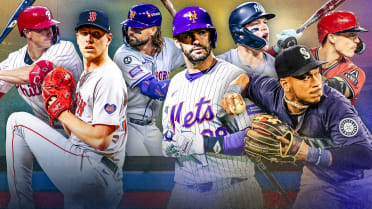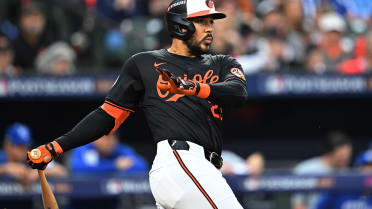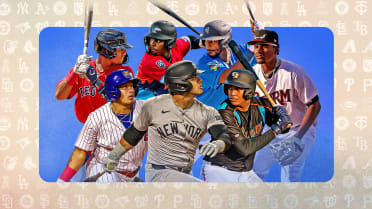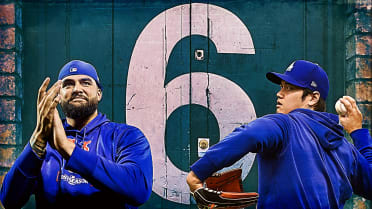The All-Star Game through the decades
Superstars, moments and streaks have shaped the previous 86 Midsummer Classics
The Midsummer Classic has provided baseball fans with plenty of memorable moments throughout the years in a rivalry that has spanned nearly a century. To accompany the scores and results of every All-Star Game, we take a look back at the streaks, highlights and players to remember through the decades, from the inaugural game in 1933 to present day.
1930s
During the 1930s, MLB welcomed the "Game of the Century." The All-Star Game premiered grandly, with Babe Ruth belting a two-run homer in an American League win in the inaugural 1933 contest -- the first of three straight victories for the Junior Circuit. The National League won for the first time in 1936, as Dizzy Dean and Carl Hubbell held the AL scoreless through six in Boston.
The latter part of the decade saw hometown heroes lift their leagues to victory. In '38, less than a month after he threw back-to-back no-hitters, Reds ace Johnny Vander Meer tossed three scoreless frames to propel the NL to a win in Cincinnati. Six Yankees then started the 1939 game in New York and knocked three of the AL's six hits, including a Joe DiMaggio homer, in a 3-1 victory.
The 1934 Midsummer Classic may have featured the most astounding collection of ballplayers, though. Hubbell starred despite coming out on the losing end, as he struck out future Hall of Famers Ruth, Lou Gehrig, Jimmie Foxx, Al Simmons and Joe Cronin in order. That group of five was only the tip of the iceberg: The AL team included eight Hall of Famers in the field, three on the bench and two in the rotation. Of the 20-man roster, 13 players are now in Cooperstown, and every member of the starting lineup owns a lifetime average better than .300.
1940s
World War II consumed the country during the 1940s, and baseball was no exception. Many players -- including perennial All-Stars and future Hall of Famers like Ted Williams, Stan Musial and Hank Greenberg -- were drafted into military service and missed much of the 1941-45 seasons. In fact, 1945 remains the only season without an All-Star Game, as it was canceled due to wartime travel restrictions.
During such a tumultuous time in history, though, the Midsummer Classic provided some much-needed sports theater for fans. The 1941 contest ended in dramatic fashion, as Williams belted a walk-off homer with two outs in the bottom of the ninth. The 1943 matchup was the first ever played at night, a trend that would become commonplace soon after. Williams again starred in the '46 All-Star Game at Fenway Park, as the Red Sox hero knocked two home runs and two singles in front of the Boston faithful.
The decade would end with the highest scoring affair to that point -- 42 players combined to tally 25 hits and 18 runs -- and it was the AL that prevailed, for its 12th win in 16 tries.
1950s
Although the National League asserted its dominance in the 1950s, the decade was highlighted by close All-Star contests, as eight of the 11 were decided by two runs or less. The first extra-inning thriller in All-Star Game history occurred in 1950, and the Senior Circuit walked away on top after Cards representative Red Schoendienst's solo shot in the 14th. The following season marked the first time that the NL won back-to-back games, as Stan Musial, Bob Elliott, Ralph Kiner and Gil Hodges slugged a team-record four home runs. The AL made sure to notch at least one victory in the decade's first half before NL fans witnessed another treat in 1955, when Musial launched a solo longball on the first pitch in the bottom of the 12th inning to end what was a marathon affair for the time at 3 hours, 17 minutes.
In 1957, the league intervened in the All-Star balloting system after some ballot stuffing by fans in Cincinnati elected seven Reds to NL starting positions. Commissioner Ford Frick named Willie Mays and Hank Aaron to the team in addition to the Cardinals' Musial, who had been voted a starter, but the Senior Circuit ultimately lost the game by one run. Two years later, the All-Star Game became a double feature, as two contests were scheduled to raise money for the players' pension fund. The NL captured the first game by one run, but the Junior Circuit split the bill a month later on the strength of three homers.
1960s
Fans of extra baseball got a special treat during the 1960s, which featured three extra-inning Midsummer Classics. Two games apiece were held from 1960-62, and the NL won both matchups in 1960, securing the only double feature sweep by either league. Despite out-hitting the AL, 11-4, in the first game of 1961, the NL needed a 10th-inning rally to seal the win. Rain stopped play in the second game that year, resulting in the first-ever All-Star Game draw. The leagues split the final set in 1962, as the Junior Circuit homered three times in the second contest for its only win of the decade.
In 1964, Willie Mays scored before Johnny Callison delivered a walk-off, three-run shot to cap a come-from-behind, ninth-inning win. In the second half of the decade, the Senior Circuit reigned supreme despite four straight one-run margins of victory. The 1966 game saw nine pitchers locked in a 1-1 duel until the 10th, when Maury Wills plated Tim McCarver with the game-winning run. The 1967 game lasted 15 innings -- tied for the longest in history -- before Tony Perez hit a game-winner. The NL finished the decade with a 9-3 romp, thanks to two homers from Willie McCovey and one from Johnny Bench.
1970s
Video: Rose and Fosse is MLB's most incredible collision
The National League's incredible hot streak continued through the 1970s, as the Senior Circuit would lose only one game during the decade, while scoring five or more runs in eight of its nine victories. The NL All-Stars nearly opened the decade with a loss, but they plated three runs in the ninth inning to force extras. Neither side scored again until the 12th, when Pete Rose infamously jarred the ball loose as he collided with catcher Ray Fosse, scoring the game-winning run. The AL notched its only victory in 1971, snapping an eight-game losing streak; six different players -- all of them future Hall of Famers -- went deep, tying an All-Star Game record. Among them was Reggie Jackson, who launched a homer an estimated 539 feet. The NL won again in extra innings in 1972, tying things up in the bottom of the ninth and winning it in the 10th on an RBI single by Joe Morgan.
The rest of the decade was relatively smooth sailing for the Senior Circuit. In 1974, AL President Lee MacPhail told Manager Dick Williams to play the best talent for as much of the game as necessary to avoid an 11th loss in 12 Midsummer Classics. Yet the NL still prevailed, thanks to two key hits from game MVP Steve Garvey. In 1977, Morgan led off the contest with a homer against Jim Palmer, and by the time the first inning ended, the NL had scored four runs and was in control. The Junior Circuit's last beacon of hope came in 1979, when it held a one-run advantage heading into the eighth. But Lee Mazilli would launch a game-tying homer in the frame and again played the hero in the ninth, drawing a bases-loaded walk to force in the winning run for the NL.
1980s
The crop of All-Star Games during the 1980s brought milestones and records. Most notably, however, a string of dominance was finally upended. More than 72,000 fans, the largest crowd in All-Star Game history, gathered at Cleveland Stadium in 1981. The NL scored all of its runs on longballs to win the contest, as Gary Carter hit two, Dave Parker hit one, and Mike Schmidt provided the game-winner with a two-run shot in the eighth. The contest was held outside the United States for the first time in 1982, as the NL hosts topped the AL by three runs at Olympic Stadium in Montreal. But in 1983, the Junior Circuit finally broke its dreaded 11-game losing streak; Fred Lynn's grand slam powered the AL to a 13-3 romp over the Senior Circuit.
The National League would win the next two contests before Dodgers ace Fernando Valenzuela fanned five straight batters to tie Carl Hubbell's All-Star Game record in 1986. But despite his lights-out showing, the AL held on for the victory. The Junior Circuit won again in 1988 thanks to Terry Steinbach's MVP performance, before Bo Jackson and Wade Boggs each hit home runs in '89 to lead the AL to consecutive wins for the first time since 1957-58.
1990s
Video: 94 ASG: McGriff's pinch-hit homer ties game in ninth
With the NL's winning streak finally broken, the American League began to build momentum. Wrigley Field, MLB's bastion of daytime baseball, hosted its third All-Star Game in 1990, and its first since installing lights. There, the AL won its third straight Midsummer Classic, as its pitchers surrendered just two hits. The Junior Circuit's winning streak continued the following year, as Cal Ripken Jr.'s three-run shot helped his team topple the NL in Toronto, and the Mariners' Ken Griffey Jr. went 3 for 3 with a homer to propel his squad to a 13-6 victory in '92.
The Senior Circuit finally broke through during the strike-shortened 1994 campaign, as Fred McGriff homered in the ninth to tie the game and Moises Alou doubled home the winning run in the 10th. The next two contests went the NL's way, as well, with Mike Piazza, Craig Biggio and Jeff Conine homering in '95 and nine Senior Circuit hurlers combining for the seventh shutout in All-Star Game history in '96. But the AL would quickly turn the tables, winning the last three contests in the decade, including a 13-8 final in 1998 -- the highest-scoring Midsummer Classic to date. These three victories signaled the start of the longest streak without a loss (2002 would end in a tie) in All-Star Game history.
2000s
The new millennium ushered in a new reign of Midsummer Classic supremacy, as the American League won all but one game from 2000-09. Historic moments punctuated many of the AL victories. Derek Jeter, who would attend 14 All-Star Games during his storied career, became the first Yankees player to take home the All-Star Game MVP Award in 2000. The retiring Cal Ripken Jr. and Tony Gwynn were honored in a mid-game ceremony in 2001, after Ripken fittingly launched the first pitch he saw for a home run. Torii Hunter made headlines in 2002, when he leapt over the wall to take away a would-be Barry Bonds home run, although Bonds would get his revenge in his next at-bat with a homer off Roy Halladay. The 2003 All-Star Game represented the first with more than pride on the line -- World Series home-field advantage for the victorious league was newly at stake -- and Hank Blalock's pinch-hit home run in the eighth inning secured that status for the eventual Junior Circuit representatives: the Yankees.
Even possibly the best closer in National League history couldn't keep his opponents at bay. In 2006, the NL summoned Padres closer Trevor Hoffman to secure a 2-1 lead in the top of the ninth. Despite recording two quick outs, he allowed back-to-back hits and a subsequent go-ahead two-run triple to Michael Young. Ichiro Suzuki hit the first-ever inside-the-park homer in All-Star Game history to keep the AL streak going in '07. The Junior Circuit would close out the decade with two more wins, including a 15-inning affair that still ranks as the longest Midsummer Classic contest ever.
2010s
Video: 2014 ASG: Jeter exits final ASG to standing ovation
After 13 seasons -- the longest winless drought by either league in the All-Star Game -- the National League could at long last do some celebrating. Still, it didn't come easy for the Senior Circuit in 2010, as the NL All-Stars trailed by one run heading into the top of the seventh inning. But after two singles and a walk, then-Braves catcher Brian McCann smoked a double to right field to clear the bases and secure a come-from-behind victory. The NL would take the next two games, as well, before a pitchers' duel between Max Scherzer and Matt Harvey flipped the script in favor of the AL in 2013. More importantly, the victory provided a fitting send-off for future Hall of Famer Mariano Rivera, who garnered MVP honors for his scoreless work in the eighth inning.
The 2014 contest was marked by the impending retirement of another Yankees legend, as Derek Jeter said goodbye to the game in dramatic fashion, leading off with a double before scoring on a Mike Trout triple. The young phenom's bat would be the difference maker that year, and he took home MVP honors for the first time thanks to a pair of RBI and a run scored. It would be a sign of things to come for Trout, who took home a second All-Star Game MVP Award in 2015 after scoring two runs and smacking a leadoff homer.
This article appears in the MLB Official All-Star Game Program. Click here to purchase a copy, and read more features on allstargame.com.



